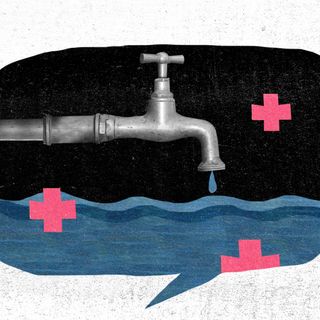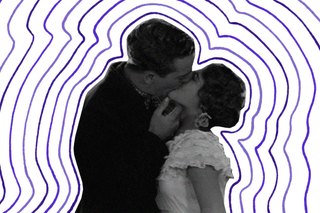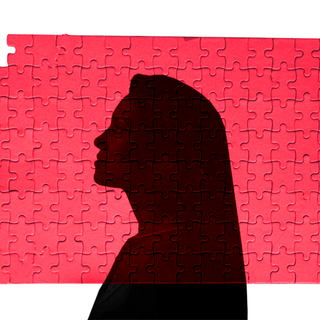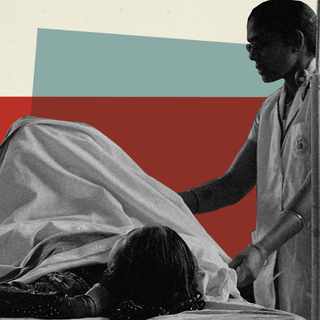
Why Kissing Became Our Go‑To Way To Express Affection
“Kissing — like touching and smelling — is an emotion-driven act that allows us to identify the most compatible and ‘evolutionary advantageous’ partner.”

From “Can your first kiss predict the future of your relationship?” to “How far into a relationship should you have your first kiss?” to “How to be a better kisser?” to even “Can I get pregnant from kissing my boyfriend?” — myriad questions about kissing abound on the Internet. But amid the cultural nuances and rigmaroles surrounding the affair of the lips, have you ever stopped to wonder: how did kissing become a universal way of expressing love?
Scientists are divided on whether the act of locking lips is learned behavior, or if it is simply instinctual. Research suggests while 90% of human beings around the world engage in making out, the remaining 10% don’t. Many of the latter, in fact, belong to secluded tribes in different parts of the world, and may not even have any idea what they’re missing out on, anthropologists claim.
While that does make the case for kissing being a learned behavior stronger, the instinctual behavior-lobbyists are quick to point out that animals — especially bonobos — kiss too. “While most animals rub noses with each other as a gesture of affection… [Bonobos] do it to make up after fights, to comfort each other, to develop social bonds, and sometimes for no clear reason at all, just like us,” LiveScience reported. Given that we share about 98.7% of our DNA with bonobos, does their behavior suggest kissing could be ingrained in our DNA? Maybe, maybe not.
In conclusion, we don’t know whether “swapping spit,” as LiveScience’s writer called it, is learned or instinctual. Alright, but why do we do it?
One theory suggests that it originated from the practice of “kiss-feeding,” or premastication — the practice of a mother chewing down food for her offspring and transferring it mouth-to-mouth. While we may primarily associate the behavior with birds, humans did it too. In fact, in some parts of the world, people still do. However, according to the Center for Disease Control and Prevention (CDC) in the U.S., it’s not a healthy practice — something that came up in 2012 when Alicia Silverstone posted a controversial video of her premasticating her baby’s food.
Related on The Swaddle:
“If young lovers exploring each other’s mouths with their tongues feel the ancient comfort of parental mouth feeding, this may help them to increase their mutual trust and thereby their pair-bonding,” writes Desmond Morris, a zoologist, ethologist, and human sociobiologist in the book Manwatching.
Maybe we’ll find out one day that the saying about the way to a person’s heart being through their stomach originates at the intersection of kissing as a means to feed, as well as an expression of love. One of the earliest iterations of the saying was in a letter written by John Adams, former U.S. President, who says that “the shortest road to men’s hearts is down their throats.” Interesting.
Another theory suggests that pheromones, or the “silent chemical messengers,” may have sped up the evolution of the romantic kiss. However, with the existence and usefulness of pheromones in humans being disputed, this theory’s relevance may be in question.
Experts who research kissing suggest the biological information individuals exchange while kissing helps them subconsciously understand whether their genes will merge to produce a strong offspring — serving an evolutionary purpose by assisting people in creating individuals with a greater chance of survival. But it sounds absurd. Like, who even thinks of immune systems and genes while in the middle of a passionate liplock? But, that’s the thing: it’s sub-conscious.
Related on The Swaddle:
New Research on Human Attraction Upends “Playing Hard to Get”
“Kissing — like touching and smelling — is an emotion-driven act that allows us to identify the most compatible and ‘evolutionary advantageous’ partner,” Fulvio Fulvio D’Acquisto, professor of immunology at Roehampton University in the U.K., told The Independent.
A group of genes we have as part of our immune systems is called the MHC (major histocompatibility complex) genes, which give us our natural scent. An experiment found women preferred t-shirts belonging to men with MHC genes very different from their own — suggesting that we’re naturally inclined to be attracted to our opposites so that it translates into a more robust immune system for our offspring. However, since several people are choosing to be childfree, will this specific motivation to kiss fizzle out from our evolutionary biology? Only time can tell, perhaps — provided climate change hasn’t killed us by then, of course.
“The MHC is detectable in body odor, so by kissing and tasting someone, it gives the opportunity to assess how similar or different that individual is to you biochemically,” Sarah Johns, an expert in human reproduction and evolutionary psychology at the University of Kent, explained. “Humans don’t have strong olfactory skills, and kissing allows you to smell and taste a person and see if you have different immune responses as we tend to feel more attracted to someone with a different immune response.”
Researchers also note it’s the release of dopamine and other “happy hormones” that make kissing so appealing — almost making it a natural “high.” “The more you get of these hormones, the more your body wants them. For some, this may be more apparent at the start of a relationship — especially if most of your time is spent in a lip lock,” an article on Healthline explains.
Mint, anyone?
Devrupa Rakshit is an Associate Editor at The Swaddle. She is a lawyer by education, a poet by accident, a painter by shaukh, and autistic by birth. You can find her on Instagram @devruparakshit.
Related


Having a Sense of Purpose in Life Helps Improve Memory, Shows Study
